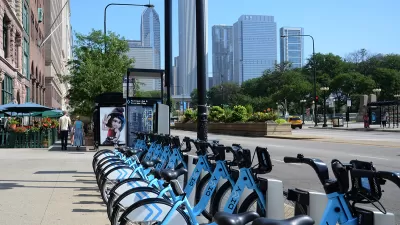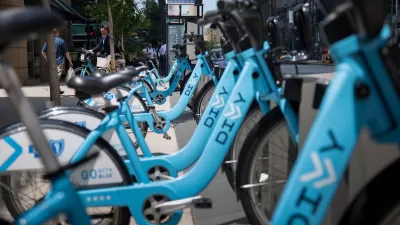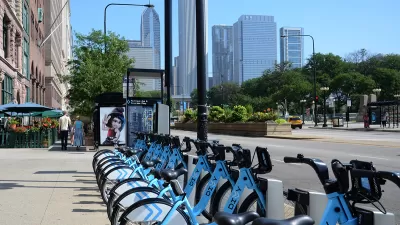Kerida Roland is an African-American delivery man based in Chicago's South Loop who put more than 6,000 miles on Divvy bikes in 2017.

Divvy's users are disproportionately wealthy whites, so when the agency announced its top rider was African American delivery rider from Bronzeville, the news seemed to break the narrative about bikeshare in Chicago. Kerida Roland rode 6,275 miles last year making deliveries everywhere from Hyde Park to Lincoln Park.
"Roland, a 25-year-old South Loop resident who takes delivery orders via the Postmates, Caviar, and Uber Eats smartphone apps, says his strategy isn't as crazy as it sounds," John Greenfield reports for the Chicago Reader. While using Divvy for work means he has to find stations periodically, he likes avoiding the maintenance and risk of riding his own bike. "Roland says he started using Divvy for deliveries after thieves nabbed three of his personal bikes, one of which he'd spent hundreds of dollars customizing," Greenfield reports.
So why don't more African Americans and Southsiders ride Divvy? Roland agrees with results of a study from the University of Portland which found, "Concerns about traffic safety, crime, police harassment, user fees, and liability for the bikes are factors in low ridership," Greenfield writes, but Roland goes on to say the city could do more to explain the program, particularly its benefits. Roland enjoys biking in part because it's more reliable than the El, and the freedom from traffic jams, means he knows when he will get where he's going.
FULL STORY: Divvy’s top rider of 2017 pedaled 6,000 miles while making food deliveries

Planetizen Federal Action Tracker
A weekly monitor of how Trump’s orders and actions are impacting planners and planning in America.

San Francisco's School District Spent $105M To Build Affordable Housing for Teachers — And That's Just the Beginning
SFUSD joins a growing list of school districts using their land holdings to address housing affordability challenges faced by their own employees.

The Tiny, Adorable $7,000 Car Turning Japan Onto EVs
The single seat Mibot charges from a regular plug as quickly as an iPad, and is about half the price of an average EV.

Seattle's Plan for Adopting Driverless Cars
Equity, safety, accessibility and affordability are front of mind as the city prepares for robotaxis and other autonomous vehicles.

As Trump Phases Out FEMA, Is It Time to Flee the Floodplains?
With less federal funding available for disaster relief efforts, the need to relocate at-risk communities is more urgent than ever.

With Protected Lanes, 460% More People Commute by Bike
For those needing more ammo, more data proving what we already knew is here.
Urban Design for Planners 1: Software Tools
This six-course series explores essential urban design concepts using open source software and equips planners with the tools they need to participate fully in the urban design process.
Planning for Universal Design
Learn the tools for implementing Universal Design in planning regulations.
Smith Gee Studio
City of Charlotte
City of Camden Redevelopment Agency
City of Astoria
Transportation Research & Education Center (TREC) at Portland State University
US High Speed Rail Association
City of Camden Redevelopment Agency
Municipality of Princeton (NJ)




























